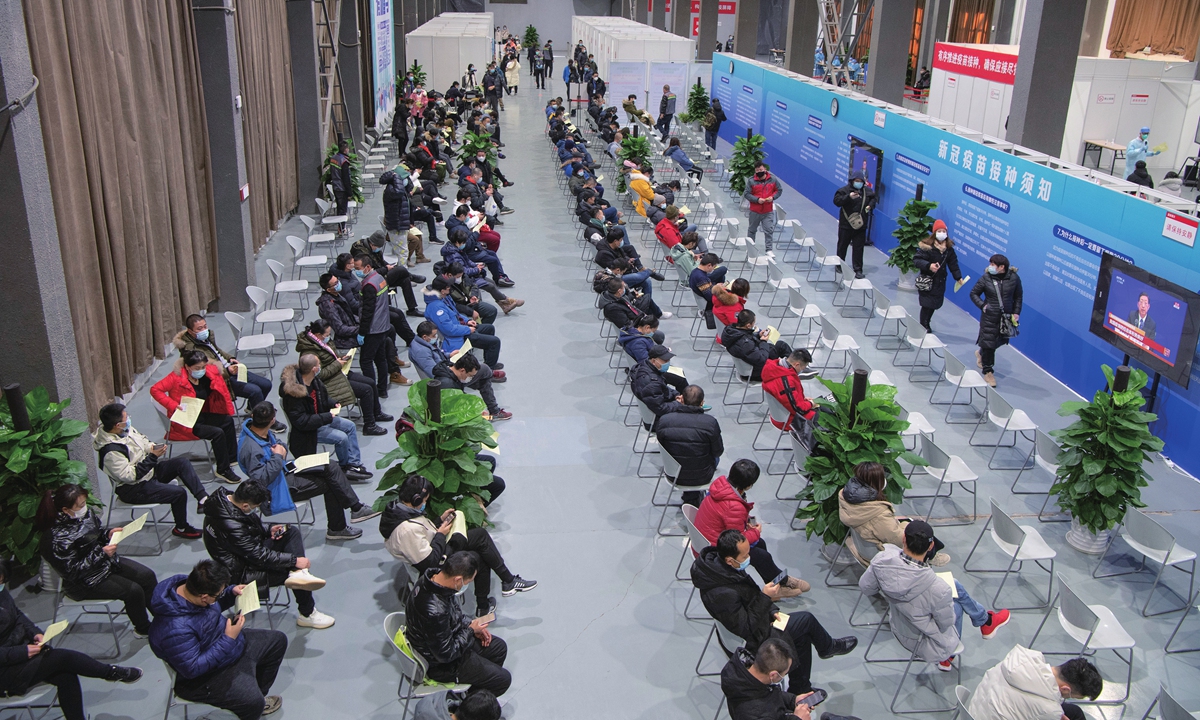
People wait for COVID-19 vaccine injections in Beijing on Sunday. Since the beginning of January 2021, the city has started vaccination in specific groups of people in industries such as catering services and cold-chain transportation. Photo: cnsphoto
The World Health Organization is reportedly reviewing Chinese COVID-19 vaccines for possible emergency listing, and Chinese analysts believe that if Chinese vaccines, including CanSinoBIO's vaccine, is approved by WHO, it would significantly improve the confidence of developing and Western countries in Chinese vaccines.
Although WHO granted first emergency validation to Pfizer/BioNTech vaccine last week, Chinese analysts said that it will not affect the Chinese vaccines' international orders as the global use of the vaccines was affected by several factors, such as vaccine prices and transportation and storage conditions, which Chinese vaccines are more cost effective.
Reuters reported on Thursday that the WHO is reviewing Chinese vaccines, along with vaccines from AstraZeneca for possible emergency listing.
The report quoted WHO immunization director Kate O'Brien as saying that the agency is reviewing "some of the vaccines from China and the AstraZeneca vaccine. We are in discussions and beginning processes with other vaccines."
The WHO did not immediately respond to a Global Times request on verifying the Reuters' report and more details of the review.
A Beijing-based immunologist who requested anonymity told the Global Times on Friday that if the report was true, the Chinese vaccine was probably from CanSinoBIO, as both vaccines from CanSinoBIO and AstraZeneca are adenoviral vector vaccines.
CanSinoBIO has initiated Phase III clinical trials for a recombinant COVID-19 vaccine (Ad5-nCoV) it developed in Mexico in November, and over 10,000 volunteers have been vaccinated in its Phase III clinical trial with no safety incident reported, the company said in December.
If Chinese vaccines are granted emergency validation by WHO, it would boost confidence from developing countries, and Western countries will also choose our vaccines, he said.
He said that the WHO granted emergency validation to the Pfizer vaccine because it was granted large-scale use in the UK and the US.
WHO authorization does not necessarily affect vaccines' global use, the immunologist said, noting vaccines need to be further evaluated on their safety and efficacy during global use.
Chinese inactivated vaccines perform better than Pfizer's mRNA vaccine, as the latter has a relatively steep price and strict requirements for storage and delivery, he said.
Five Chinese COVID-19 vaccine candidates - two inactivated vaccines developed by the China National Pharmaceutical Group (Sinopharm), one inactivated vaccine developed by Sinovac Biotech Co., one adenoviral vector vaccine jointly developed by the Academy of Military Sciences and the Chinese biotech company CanSino, and one recombinant protein vaccine developed by Anhui Zhifei Longcom Biologic Pharmacy - are under phase-III clinical trials in countries like Pakistan and Peru.




